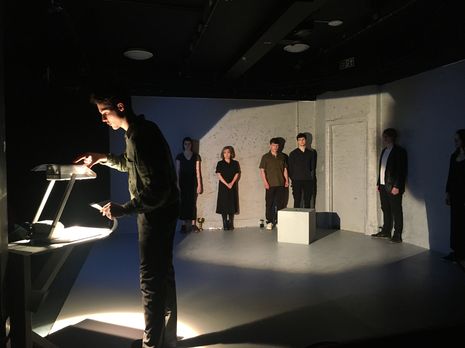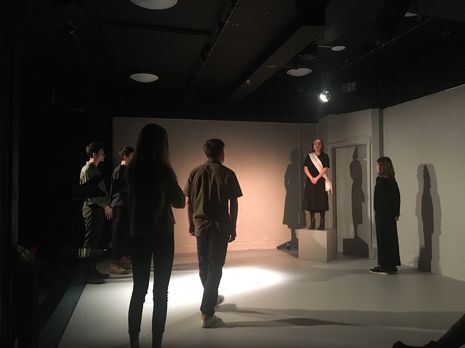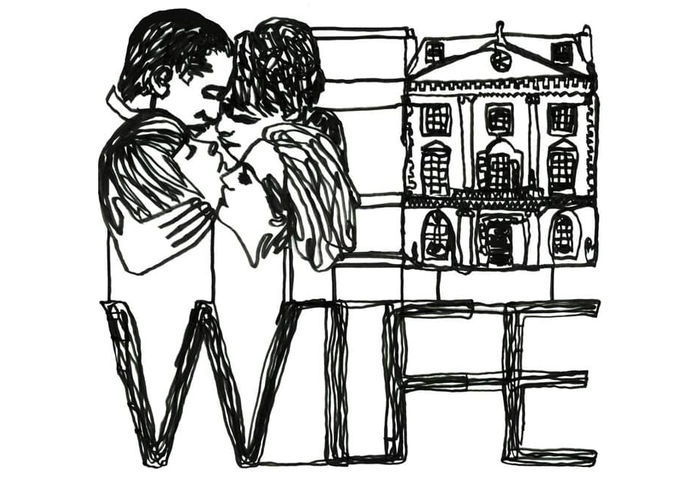Julius Caesar is how Shakespeare should be delivered
Jessye Clarke marvels at this exceedingly talented cast’s performance of Shakespeare’s Julius Caesar, but struggles with its broader implications

Julius Caesar is one of Shakespeare’s best-known historical tragedies. Threatened by the likelihood that Caesar will be offered the position of monarch, a conspiracy emerges among Brutus, Cassius and Casca to kill Caesar, in a complex mesh of patriotism, fear, and loyalty.
The brilliant acting was the most remarkable aspect of this production. The cast clearly understood that in any production of Shakespeare, the actors have to rely on a dynamic range of non-verbal techniques to allow anyone unfamiliar with the play to grasp the plot and make the script come alive. The actors clearly had a nuanced understanding of the play, which allowed them to masterfully draw out the underlying narrative tensions in the script and translate them to their audience. The range and expressiveness of the acting was also reflective of skilled direction, with particularly standout performances from Gabriel Wheble (Cassius) and Theo Collins (Casca), who together had an intelligent combination of slipperiness and charisma.
"The brilliant acting was the most remarkable aspect of this production"
There was also an impressively confident physicality to the performances - the scenes of violence - particularly the climactic murder of Caesar - were coordinated so realistically that you almost had to look away. This fight choreography (coordinated by Eleanor Lind Booton) used minimal props and mainly just the bodies of the actors, and was both unusual and shocking, without being overly theatrical.

Caesar and Mark Anthony were played skillfully by Rachel Kitts and Saskia West respectively. Kitts delivered Caesar as a polished and tactful politician, and West was believably enraged and hurt by the murder of her friend. However, instead of leaving the script intact, the pronouns for these characters were reversed: Caesar and Anthony actually became women in the play. This was an interesting, but perhaps misguided choice. There was no obvious reason to edit Shakespeare’s plot like this - although it admittedly added a complexity to the theme of Brutus and Cassius being threatened by Caesar’s growing power (instead of being threatened by power in general, they were suddenly threatened by a specifically female power), the play would have been just as interesting if Kitts had instead been allowed to play the role of a man. Julius Caesar is an archetypally male play, and this would have been better communicated if Caesar had been played by a woman rather than turned into one. It felt like a denial of the issue, rather than an exposure of it.
Both the costumes and Daniel Dickins’ lighting were kept neutral, with ordinary, modern and slightly conservative clothing (plus a good pair of heeled cowboy boots for Casca). While the neutrality didn’t detract from the performance, combined with Isobel Woods’ equally bare set design, it left open the question of whether a more visually adventurous production could have been realised. But as is common with Shakespeare, as long as the acting is good, the script speaks for itself.
Julius Caesar is well worth seeing, carried by talented actors and cinematic violence that merge to create an impressive, if understated, production.
 News / SU reluctantly registers controversial women’s soc18 December 2025
News / SU reluctantly registers controversial women’s soc18 December 2025 Features / Should I stay or should I go? Cambridge students and alumni reflect on how their memories stay with them15 December 2025
Features / Should I stay or should I go? Cambridge students and alumni reflect on how their memories stay with them15 December 2025 News / Dons warn PM about Vet School closure16 December 2025
News / Dons warn PM about Vet School closure16 December 2025 News / Cambridge study finds students learn better with notes than AI13 December 2025
News / Cambridge study finds students learn better with notes than AI13 December 2025 Comment / The magic of an eight-week term15 December 2025
Comment / The magic of an eight-week term15 December 2025









